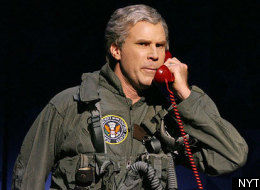Both of these movies will make you think a little more about what you buy and what you eat. That may or may not be a good thing. Both of these movies take on the food industry, taking on factory farming and modern food production.
Food, Inc., and American production, is more alarmist and overstated, in typical American fashion, than
We Feed the World, which is German. The latter, more substantive and fair than
Food, Inc., has more a documentary feel in its pacing and tone. Both make me want to go to the farmers' market and quit eating meat.
![[we_feed_the_world_01.png]](https://blogger.googleusercontent.com/img/b/R29vZ2xl/AVvXsEhLAGjZdrd8mGB38WMh8LBgtG0N6yRDZqnO4MReOJ17ISHso34ZP9-jJmb9coXPfmK0Bs60JMBo-UJg8LT2H84KZawD9WohOgyF3VvrCnL090mpjhu6BhgT72Dw4_GCVf0T9_dg5kjScCeH/s320/we_feed_the_world_01.png) |
| A huge amount of the world's food production, like this warehouse full of bread, is thrown away every year. |
The message of these films is simple: modern food production sacrifices quality for quantity, industrializes natural processes, and removes us from our agricultural roots. Both have eye-opening scenes from the poutltry industry. With major fast-food restaurants using such a huge portion of the meat raised in the U.S., and with a very small number of companies, poultry farmers are beholden to the requirements of the fast-food industry. Thus, even if you never eat fast food, your conusumption is determined, in part, by the fast-food industry.
Take chickens. Large restaurant chain chicken buyers want chicken breasts of a specific size. So chicken farmers breed chickens with large breasts and overall uniform size, and which grow quickly. Their quick growth and disproportional body parts are so extreme that some can't even walk. They are not so much beautiful members of the animal kingdom as factory produced commodities. The eggs are hatched in large incubators, taken in boxes to the huge, crowded barns, where they are packed for their shortened lives to grow in absurdly cramped conditions. If they fall ill (which many do; infection spreads quickly in these conditions), they are shoveled up and carried away. When they're full-grown, it's off to the slaughterhouse. The footage from the chicken and beef slaughterhouses are incredible in their extreme automation (made possible my the uniform animal size) and disgusting in their, well, disgustingness.

Despite the horror shows these films feature, I think they overlook the practical, human side of the food industry. Thomas Malthus and his followers predicted that we would not be able to feed the world, given population trends. He didn't anticipate advances in agricultural technology, which has enabled the growth of food production worldwide to far exceed the needs of our population. Like the producers of these films, I would prefer food grown naturally, animals raised and slaughtered humanely, and produce naturally ripened and eaten fresh. But given our needs, that pastoral vision is impractical. In order to feed a growing population, certain efficiencies have to be sought. The division of labor and specilization have enabled us to reach a point where, unfortunately, a sizable percentage of food produced worldwide goes to waste. Can we be more efficient in our distribution and more and improve prodution value? Yes, always. But I, for one, am thankful for the ever-increasing capacities of the food industry.
Bottom line, 2 stars a piece.

![[we_feed_the_world_01.png]](https://blogger.googleusercontent.com/img/b/R29vZ2xl/AVvXsEhLAGjZdrd8mGB38WMh8LBgtG0N6yRDZqnO4MReOJ17ISHso34ZP9-jJmb9coXPfmK0Bs60JMBo-UJg8LT2H84KZawD9WohOgyF3VvrCnL090mpjhu6BhgT72Dw4_GCVf0T9_dg5kjScCeH/s320/we_feed_the_world_01.png)





